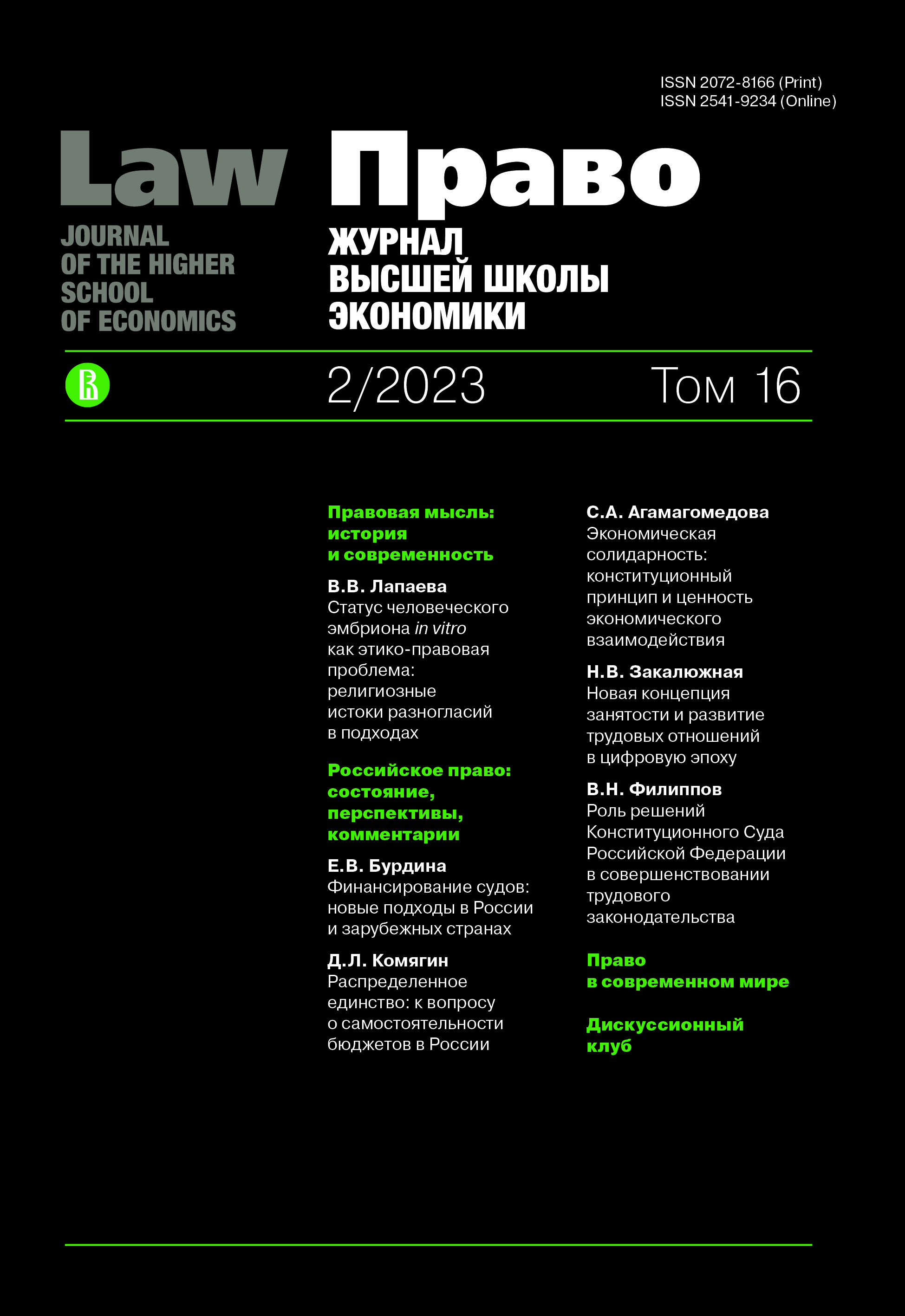Манипулирование юридическими целями: понятие и признаки
Аннотация
Сложившиеся реалии свидетельствуют, что манипулирование как востребованное и весьма распространенное средство воздействия на общественные отношения активно используется и в процессе правового регулирования. Это не может и не должно игнорироваться специалистами как общей теории права, так и отраслевых юридических наук. В статье обосновывается, что манипулирование юридическими целями является самостоятельным видом правомерного поведения, изучение которого позволит не только существенно обогатить инструментальную теорию права, но и значительно повысить действенность механизма правового регулирования, разнообразить традиционные подходы к анализу юридических целей и средств и их потенциала, равно как и распознавать недобросовестное использование юридических средств в достижении манипулятивных юридических целей. Особое внимание уделяется исследованию манипулирования юридическими целями как явления, имманентно присущего регулированию общественных отношений, его природы, содержания, признаков и последствий. Автором обосновывается позиция, что манипулирование юридическими целями — это форма правомерного поведения, несмотря на то, что достижение целей манипулятора осуществляется в ущерб интересам объекта манипулирования. Основополагающим методом исследования выступила материалистическая диалектика, которая позволила обосновать гетерогенную природу манипулирования юридическими целями и ее роль в обеспечении баланса интересов личности, общества и государства. Формально-юридический метод в сочетании с законами логики и структурно-функциональным подходом использовались при формулировке авторских дефиниций. Также активно применялись положения герменевтики и различные технологии интерпретации текстов нормативно-правовых актов, методы анализа и синтеза, дедукции и индукции. Сформулирован вывод, что хотя манипулирование юридическими целями трансформирует потребности и интересы участников правоотношений в угоду позиции субъекта управления и вводит объект манипулирования в заблуждение, оно выступает социально-обусловленным способом воздействия на участников правоотношений, соответствует законодательству и позволяет реализовать непопулярные решения. Подчеркивается, что манипулирование юридическими целями нуждается в дальнейшем исследовании.Литература
Aleshin D.A. (2014) Social contextuality of law: social challenges and legal consequences. Vestnik RUDN=Bulletin of RUDN, no. 4, pp. 57-66 (in Russ.)
Baitin M.I. (2000) On the modern normative understanding of law. Ezhegodnik Rossiyskogo prava=Yearbook of Russian Law 2000. Moscow: Norma, pp. 210-218 (in Russ.)
Bessonov B.N. (1971) The ideology of spiritual suppression. Moscow: Mysl, 294 p. (in Russ.)
Dijk T. (2006) Discourse and Manipulation. Discourse and Society, no. 2, pp. 359-383. DOI: https://doi.org/10.1177/0957926506060250
Dijk T. (2001) Multidisciplinary CDA: a plea for diversity. In: Methods of critical discourse analysis. R. Wodak (ed.). London: Sage, pp. 95-120. DOI: https://doi.org/10.4135/9780857028020.n5
Dotsenko E.L. (1997) Psychology of manipulation: phenomena, mechanisms and protection. Moscow: University Press, 344 p. (in Russ.)
Ekimov A.I. (1970) The category of purpose in the science of law. In: Philosophical issues of state and law. Leningrad: University Press, pp. 51-58 (in Russ.)
Goodin R. (1982) Manipulatory politics. Urbana: University of Illinois Press, 250 p.
Kalinich V.S. (2021) Social manipulation in a pandemic. Social'no-gumanitarnye znaniya=Social Humanitarian Knowledge, no. 1, pp. 164-173 (in Russ.) DOI: https://doi.org/10.34823/SGZ.2021.1.51523
Kazimirchuk V.P. (1965) Law and methods of its study. Moscow: Juridicheskaya literatura, 204 p. (in Russ.)
Kikhtan V.V., Mamieva B. Yu. (2018) Manipulation in modern media. Vestnik Volzhskogo universiteta=Bulletin of Volga University, no. 2, pp. 236-242 (in Russ.)
Krasavchikov O.A. (1958) Legal facts in the Soviet civil law. Moscow: Gosyurizdat, 183 p. (in Russ.)
Malko A.V., Shundikov K.V. (2003) Goals and means in law and legal policy. Saratov: State Law Academy, 294 p. (in Russ.)
Malko A.V., Subochev V.V. (2021) Political and legal manipulation as a psychological phenomenon and academic category. Psihologiya i pravo=Psychology and Law, no. 1, pp. 163-180 (in Russ.) DOI: https://doi.org/10.17759/psylaw.2021110113
Massa L. (2022) Fake news and media manipulation: Italian and European remedies. Available at: URL: SSRN: https://ssrn.com/abstract=4022555 DOI: https://doi.org/10.2139/ssrn.4022555
Moiseeva A.V. (2022) On the speech manipulation. Mezhdunarodnyj zhurnal gumanitarnyh i estestvennyh nauk=International Journal of the Humanities and Natural Sciences, no. 2, pp. 43-45 (in Russ.)
Nudel S.L. (2012) Market manipulation: criminal law characteristics. Nauchny vestnik Omskoy akademii MVD Rossii=Bulletin of Omsk Academy of Internal, no. 1, pp. 14-19 (in Russ.)
Pavlov V.I. (2010) Death of subject of law, or need to develop a new concept of “legal man”. Filosofiya prava=Philosophy of Law, no. 3, pp. 15-23 (in Russ.)
Puginsky B.I. (2011) Instrumental theory of legal regulation. Vestnik MGU=Bulletin of Moscow State University, no. 3, pp. 22-31 (in Russ.)
Schiller G. (1980) Manipulators of consciousness. Moscow: Mysl, 326 p. (in Russ.)
Shcheglov A.V. (2019) Social stereotyping of the brand: manipulation of consciousness. Vestnik ekonomicheskoi bezopasnosti=Bulletin of Economic Security, no. 3, pp. 335-339 (in Russ.)
Shcherbinin S.S. (2002) Issue of purpose in the theory of state. Candidate of Juridical Sciences Thesis. Moscow, 218 p. (in Russ.)
Sheinov V.P. (2022) Manipulation and protection against manipulation. Saint Petersburg: Piter Press, 384 p. (in Russ.)
Sirazetdinova M., Stoletov A. et al. (2021) Manipulation, individuation, and the self. Cogito, no. 4, pp. 103-123.
Stolyarenko A.M., Serdyuk N.V. et al. (2019) Psychological aspects of destructive information-psychological influence. Psihologiya i pravo=Psychology and Law, no. 4, pp. 75-89 (in Russ.) DOI: https://doi.org/10.17759/psylaw.2019090406
Subochev V.V. (2003) Law and its role in ensuring dialectical unity of personal, public and state interests. Pravo i politika=Law and Politics, no. 12, pp. 4-11 (in Russ.)
Subochev V.V. (2004) Philosophical and logical aspects of the dialectical relationship of interests and law. Filosofiya prava=Philosophy of Law, no. 4, pp. 6573 (in Russ.)
Subochev V.V. (2019) Political and legal manipulation as a basis for social management in the era of post-truth. Vestnik Tomskogo gosudarstvennogo universiteta. Pravo=Tomsk State University Journal of Law, no. 34, pp. 29-43 (in Russ.)
Tatarinov K.A., Muzyka S.M. (2020) Psychological manipulation in advertising. Azimut nauchnyh issledovanij: pedagogika i psihologiya=Azimuth of research: pedagogy and psychology, no. 3, pp. 179-182 (in Russ.)
Wilson P. et al. (1996) Machiavellanism: a synthetic of the evolutionary and psychological literatures. Psychological Bulletin, no. 2, pp. 114-118. DOI: https://doi.org/10.1037//0033-2909.119.2.285
Zorkin V.D. (2020) Providentia, or about the future law in the era of digitalization. Gosudarstvo i pravo=State and Law, no. 6, pp. 7-19 (in Russ.) DOI: https://doi.org/10.31857/S013207690009932-7
Copyright (c) 2023 Право. Журнал Высшей школы экономики

Это произведение доступно по лицензии Creative Commons «Attribution-ShareAlike» («Атрибуция — На тех же условиях») 4.0 Всемирная.


















